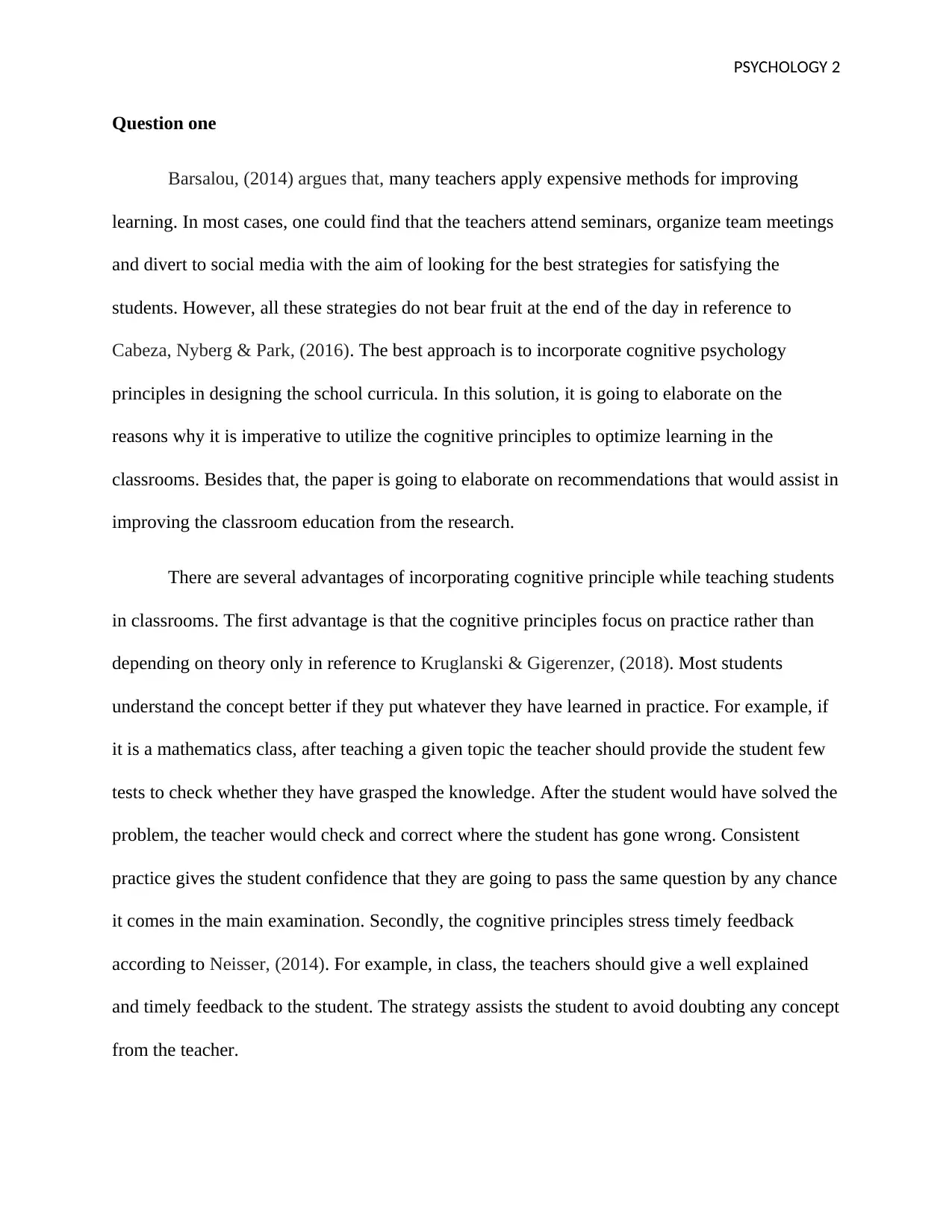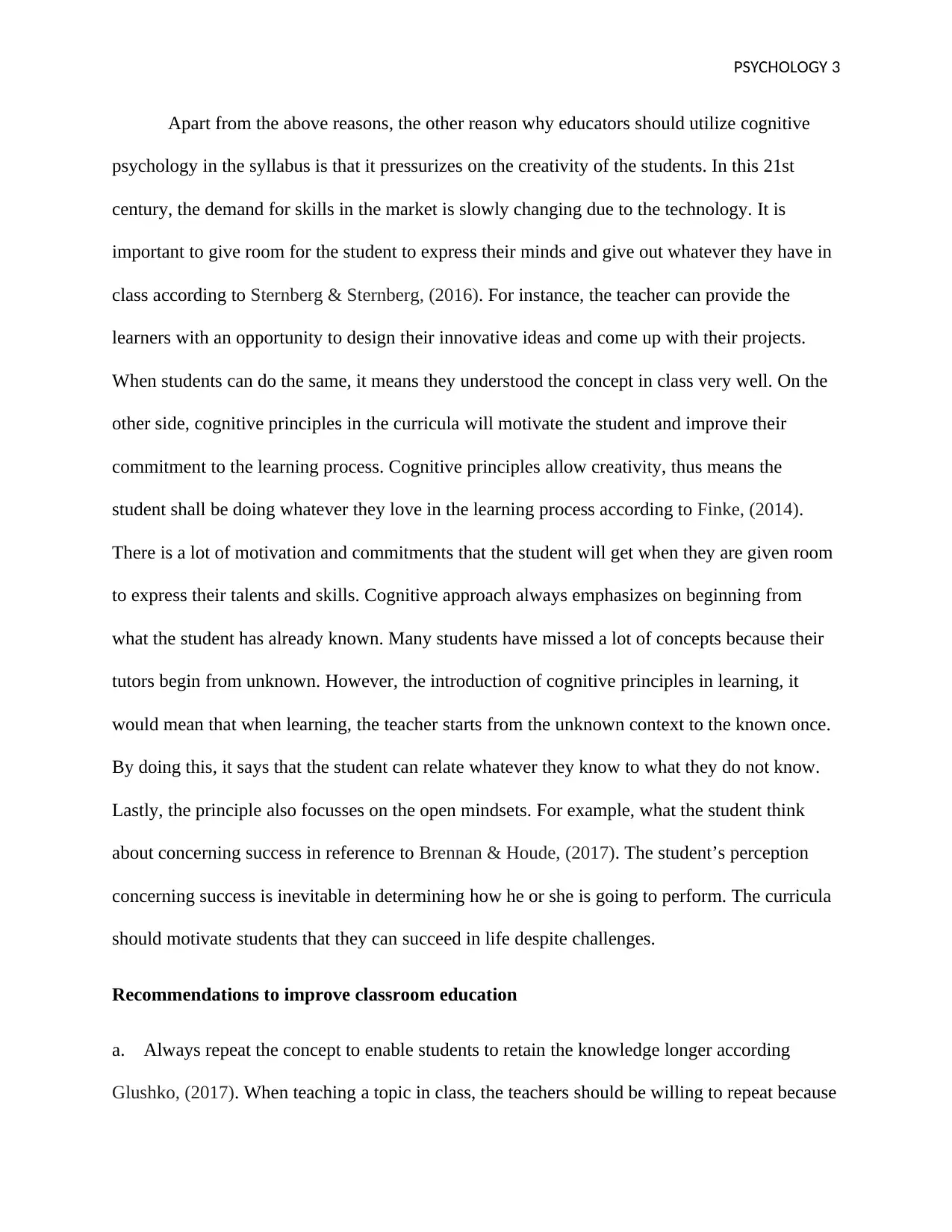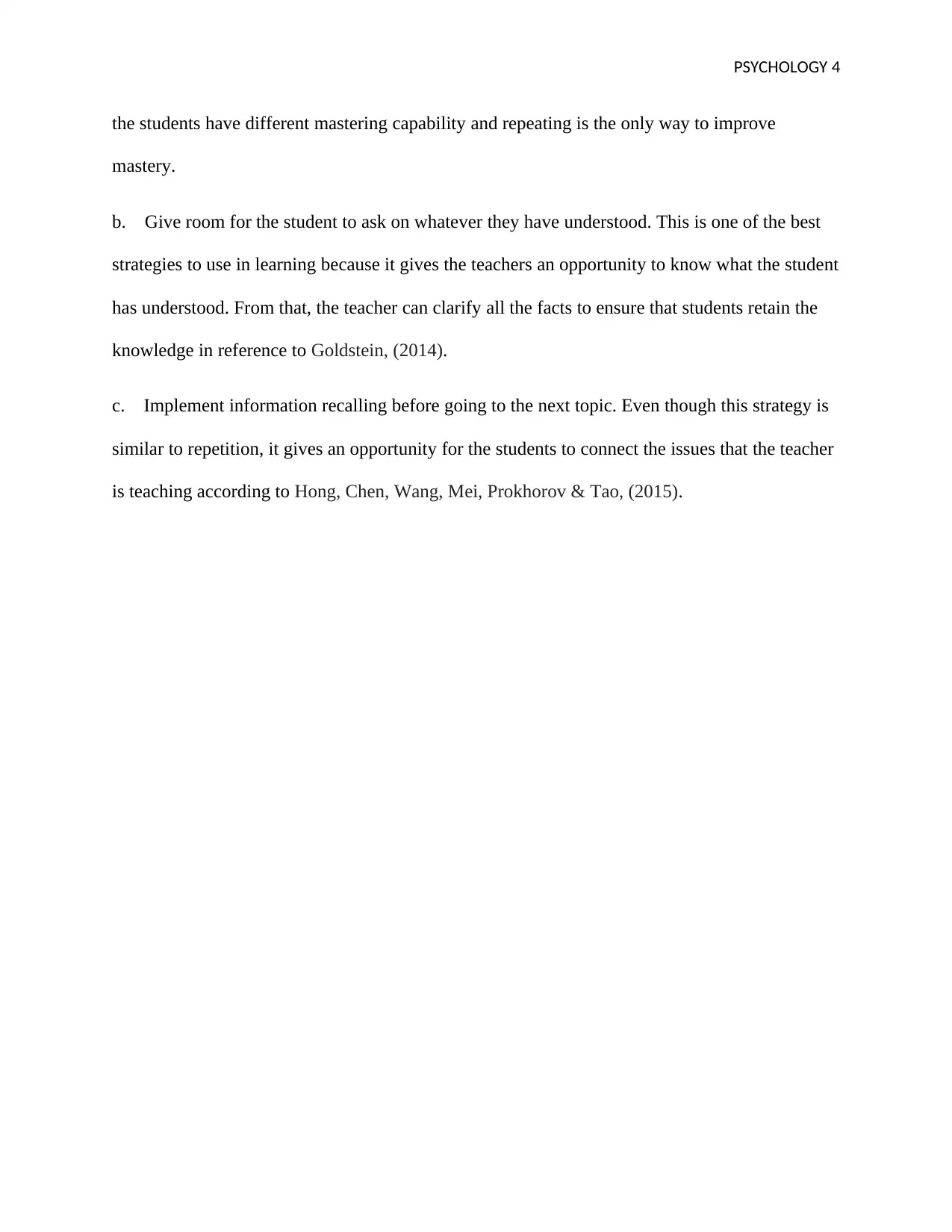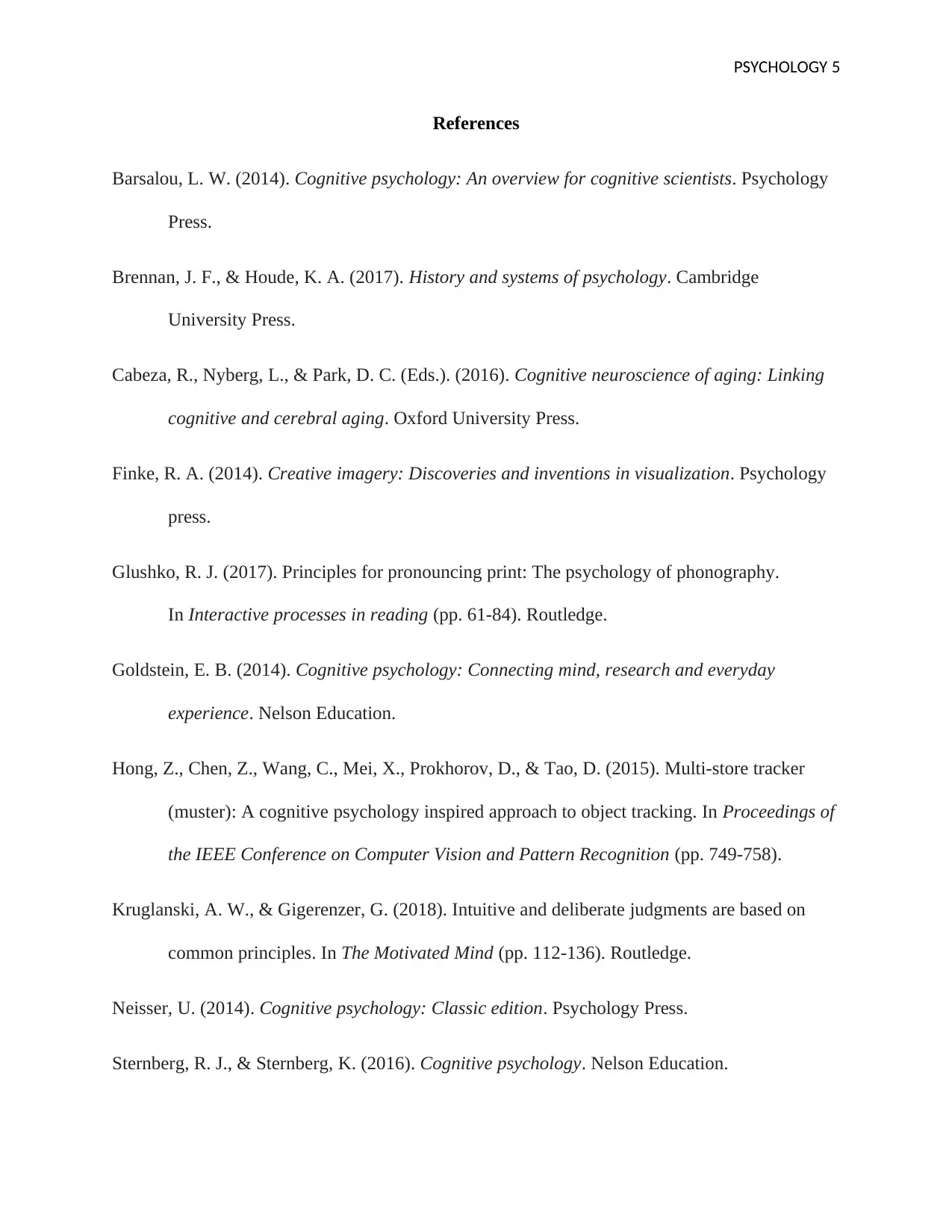Cognitive Psychology Principles: Optimizing Learning in Classrooms
VerifiedAdded on 2023/06/04
|5
|1165
|447
Essay
AI Summary
This essay explores the importance of incorporating cognitive psychology principles into school curricula to optimize learning in classrooms. It argues that cognitive principles focus on practice, timely feedback, and fostering student creativity, all of which enhance motivation and commitment to the learning process. The essay emphasizes starting from what students already know and promoting open mindsets to improve their perception of success. Furthermore, it provides recommendations to improve classroom education, including repeating concepts, encouraging questions, and implementing information recalling before moving to new topics. The essay concludes by highlighting the benefits of these strategies in improving student mastery and knowledge retention. Desklib offers a platform for students to access this essay and other resources for their studies.

Running head: PSYCHOLOGY
Psychology
Name
ID
Course
Unit
Lecturer
Date
Psychology
Name
ID
Course
Unit
Lecturer
Date
Paraphrase This Document
Need a fresh take? Get an instant paraphrase of this document with our AI Paraphraser

PSYCHOLOGY 2
Question one
Barsalou, (2014) argues that, many teachers apply expensive methods for improving
learning. In most cases, one could find that the teachers attend seminars, organize team meetings
and divert to social media with the aim of looking for the best strategies for satisfying the
students. However, all these strategies do not bear fruit at the end of the day in reference to
Cabeza, Nyberg & Park, (2016). The best approach is to incorporate cognitive psychology
principles in designing the school curricula. In this solution, it is going to elaborate on the
reasons why it is imperative to utilize the cognitive principles to optimize learning in the
classrooms. Besides that, the paper is going to elaborate on recommendations that would assist in
improving the classroom education from the research.
There are several advantages of incorporating cognitive principle while teaching students
in classrooms. The first advantage is that the cognitive principles focus on practice rather than
depending on theory only in reference to Kruglanski & Gigerenzer, (2018). Most students
understand the concept better if they put whatever they have learned in practice. For example, if
it is a mathematics class, after teaching a given topic the teacher should provide the student few
tests to check whether they have grasped the knowledge. After the student would have solved the
problem, the teacher would check and correct where the student has gone wrong. Consistent
practice gives the student confidence that they are going to pass the same question by any chance
it comes in the main examination. Secondly, the cognitive principles stress timely feedback
according to Neisser, (2014). For example, in class, the teachers should give a well explained
and timely feedback to the student. The strategy assists the student to avoid doubting any concept
from the teacher.
Question one
Barsalou, (2014) argues that, many teachers apply expensive methods for improving
learning. In most cases, one could find that the teachers attend seminars, organize team meetings
and divert to social media with the aim of looking for the best strategies for satisfying the
students. However, all these strategies do not bear fruit at the end of the day in reference to
Cabeza, Nyberg & Park, (2016). The best approach is to incorporate cognitive psychology
principles in designing the school curricula. In this solution, it is going to elaborate on the
reasons why it is imperative to utilize the cognitive principles to optimize learning in the
classrooms. Besides that, the paper is going to elaborate on recommendations that would assist in
improving the classroom education from the research.
There are several advantages of incorporating cognitive principle while teaching students
in classrooms. The first advantage is that the cognitive principles focus on practice rather than
depending on theory only in reference to Kruglanski & Gigerenzer, (2018). Most students
understand the concept better if they put whatever they have learned in practice. For example, if
it is a mathematics class, after teaching a given topic the teacher should provide the student few
tests to check whether they have grasped the knowledge. After the student would have solved the
problem, the teacher would check and correct where the student has gone wrong. Consistent
practice gives the student confidence that they are going to pass the same question by any chance
it comes in the main examination. Secondly, the cognitive principles stress timely feedback
according to Neisser, (2014). For example, in class, the teachers should give a well explained
and timely feedback to the student. The strategy assists the student to avoid doubting any concept
from the teacher.

PSYCHOLOGY 3
Apart from the above reasons, the other reason why educators should utilize cognitive
psychology in the syllabus is that it pressurizes on the creativity of the students. In this 21st
century, the demand for skills in the market is slowly changing due to the technology. It is
important to give room for the student to express their minds and give out whatever they have in
class according to Sternberg & Sternberg, (2016). For instance, the teacher can provide the
learners with an opportunity to design their innovative ideas and come up with their projects.
When students can do the same, it means they understood the concept in class very well. On the
other side, cognitive principles in the curricula will motivate the student and improve their
commitment to the learning process. Cognitive principles allow creativity, thus means the
student shall be doing whatever they love in the learning process according to Finke, (2014).
There is a lot of motivation and commitments that the student will get when they are given room
to express their talents and skills. Cognitive approach always emphasizes on beginning from
what the student has already known. Many students have missed a lot of concepts because their
tutors begin from unknown. However, the introduction of cognitive principles in learning, it
would mean that when learning, the teacher starts from the unknown context to the known once.
By doing this, it says that the student can relate whatever they know to what they do not know.
Lastly, the principle also focusses on the open mindsets. For example, what the student think
about concerning success in reference to Brennan & Houde, (2017). The student’s perception
concerning success is inevitable in determining how he or she is going to perform. The curricula
should motivate students that they can succeed in life despite challenges.
Recommendations to improve classroom education
a. Always repeat the concept to enable students to retain the knowledge longer according
Glushko, (2017). When teaching a topic in class, the teachers should be willing to repeat because
Apart from the above reasons, the other reason why educators should utilize cognitive
psychology in the syllabus is that it pressurizes on the creativity of the students. In this 21st
century, the demand for skills in the market is slowly changing due to the technology. It is
important to give room for the student to express their minds and give out whatever they have in
class according to Sternberg & Sternberg, (2016). For instance, the teacher can provide the
learners with an opportunity to design their innovative ideas and come up with their projects.
When students can do the same, it means they understood the concept in class very well. On the
other side, cognitive principles in the curricula will motivate the student and improve their
commitment to the learning process. Cognitive principles allow creativity, thus means the
student shall be doing whatever they love in the learning process according to Finke, (2014).
There is a lot of motivation and commitments that the student will get when they are given room
to express their talents and skills. Cognitive approach always emphasizes on beginning from
what the student has already known. Many students have missed a lot of concepts because their
tutors begin from unknown. However, the introduction of cognitive principles in learning, it
would mean that when learning, the teacher starts from the unknown context to the known once.
By doing this, it says that the student can relate whatever they know to what they do not know.
Lastly, the principle also focusses on the open mindsets. For example, what the student think
about concerning success in reference to Brennan & Houde, (2017). The student’s perception
concerning success is inevitable in determining how he or she is going to perform. The curricula
should motivate students that they can succeed in life despite challenges.
Recommendations to improve classroom education
a. Always repeat the concept to enable students to retain the knowledge longer according
Glushko, (2017). When teaching a topic in class, the teachers should be willing to repeat because
⊘ This is a preview!⊘
Do you want full access?
Subscribe today to unlock all pages.

Trusted by 1+ million students worldwide

PSYCHOLOGY 4
the students have different mastering capability and repeating is the only way to improve
mastery.
b. Give room for the student to ask on whatever they have understood. This is one of the best
strategies to use in learning because it gives the teachers an opportunity to know what the student
has understood. From that, the teacher can clarify all the facts to ensure that students retain the
knowledge in reference to Goldstein, (2014).
c. Implement information recalling before going to the next topic. Even though this strategy is
similar to repetition, it gives an opportunity for the students to connect the issues that the teacher
is teaching according to Hong, Chen, Wang, Mei, Prokhorov & Tao, (2015).
the students have different mastering capability and repeating is the only way to improve
mastery.
b. Give room for the student to ask on whatever they have understood. This is one of the best
strategies to use in learning because it gives the teachers an opportunity to know what the student
has understood. From that, the teacher can clarify all the facts to ensure that students retain the
knowledge in reference to Goldstein, (2014).
c. Implement information recalling before going to the next topic. Even though this strategy is
similar to repetition, it gives an opportunity for the students to connect the issues that the teacher
is teaching according to Hong, Chen, Wang, Mei, Prokhorov & Tao, (2015).
Paraphrase This Document
Need a fresh take? Get an instant paraphrase of this document with our AI Paraphraser

PSYCHOLOGY 5
References
Barsalou, L. W. (2014). Cognitive psychology: An overview for cognitive scientists. Psychology
Press.
Brennan, J. F., & Houde, K. A. (2017). History and systems of psychology. Cambridge
University Press.
Cabeza, R., Nyberg, L., & Park, D. C. (Eds.). (2016). Cognitive neuroscience of aging: Linking
cognitive and cerebral aging. Oxford University Press.
Finke, R. A. (2014). Creative imagery: Discoveries and inventions in visualization. Psychology
press.
Glushko, R. J. (2017). Principles for pronouncing print: The psychology of phonography.
In Interactive processes in reading (pp. 61-84). Routledge.
Goldstein, E. B. (2014). Cognitive psychology: Connecting mind, research and everyday
experience. Nelson Education.
Hong, Z., Chen, Z., Wang, C., Mei, X., Prokhorov, D., & Tao, D. (2015). Multi-store tracker
(muster): A cognitive psychology inspired approach to object tracking. In Proceedings of
the IEEE Conference on Computer Vision and Pattern Recognition (pp. 749-758).
Kruglanski, A. W., & Gigerenzer, G. (2018). Intuitive and deliberate judgments are based on
common principles. In The Motivated Mind (pp. 112-136). Routledge.
Neisser, U. (2014). Cognitive psychology: Classic edition. Psychology Press.
Sternberg, R. J., & Sternberg, K. (2016). Cognitive psychology. Nelson Education.
References
Barsalou, L. W. (2014). Cognitive psychology: An overview for cognitive scientists. Psychology
Press.
Brennan, J. F., & Houde, K. A. (2017). History and systems of psychology. Cambridge
University Press.
Cabeza, R., Nyberg, L., & Park, D. C. (Eds.). (2016). Cognitive neuroscience of aging: Linking
cognitive and cerebral aging. Oxford University Press.
Finke, R. A. (2014). Creative imagery: Discoveries and inventions in visualization. Psychology
press.
Glushko, R. J. (2017). Principles for pronouncing print: The psychology of phonography.
In Interactive processes in reading (pp. 61-84). Routledge.
Goldstein, E. B. (2014). Cognitive psychology: Connecting mind, research and everyday
experience. Nelson Education.
Hong, Z., Chen, Z., Wang, C., Mei, X., Prokhorov, D., & Tao, D. (2015). Multi-store tracker
(muster): A cognitive psychology inspired approach to object tracking. In Proceedings of
the IEEE Conference on Computer Vision and Pattern Recognition (pp. 749-758).
Kruglanski, A. W., & Gigerenzer, G. (2018). Intuitive and deliberate judgments are based on
common principles. In The Motivated Mind (pp. 112-136). Routledge.
Neisser, U. (2014). Cognitive psychology: Classic edition. Psychology Press.
Sternberg, R. J., & Sternberg, K. (2016). Cognitive psychology. Nelson Education.
1 out of 5
Related Documents
Your All-in-One AI-Powered Toolkit for Academic Success.
+13062052269
info@desklib.com
Available 24*7 on WhatsApp / Email
![[object Object]](/_next/static/media/star-bottom.7253800d.svg)
Unlock your academic potential
Copyright © 2020–2025 A2Z Services. All Rights Reserved. Developed and managed by ZUCOL.




